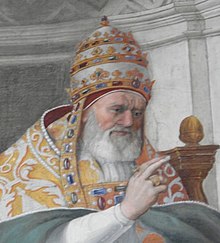Pope Gregory IX
|
Pope Gregory IX |
|
|---|---|
 |
|
| Papacy began | 19 March 1227 |
| Papacy ended | 22 August 1241 |
| Predecessor | Honorius III |
| Successor | Celestine IV |
| Orders | |
| Created Cardinal | December 1198 by Innocent III |
| Personal details | |
| Birth name | Ugolino di Conti |
| Born | between 1145 and 1170 Anagni, Papal States, Holy Roman Empire |
| Died | 22 August 1241 (aged 70–96) Rome, Papal States, Holy Roman Empire |
| Previous post |
|
| Coat of arms | |
|
Papal styles of Pope Gregory IX |
|
|---|---|
 |
|
| Reference style | His Holiness |
| Spoken style | Your Holiness |
| Religious style | Holy Father |
| Posthumous style | None |
Pope Gregory IX Latin: Gregorius IX (born Ugolino di Conti; c. 1145 or before 1170 – 22 August 1241), was Pope from 19 March 1227 to his death in 1241. He is known for issuing the Decretales and instituting the Papal Inquisition, a mechanism that severely punished people accused of heresy, in response to the failures of the episcopal inquisitions established during the time of Pope Lucius III through his papal bull Ad abolendam issued in 1184.
The successor of Pope Honorius III, he fully inherited the traditions of Pope Gregory VII and of his cousin Pope Innocent III, and zealously continued their policy of Papal supremacy.
Ugolino (Hugh) was born in Anagni. The date of his birth varies in sources between c. 1145 and 1170. He received his education at the Universities of Paris and Bologna.
He was created Cardinal-Deacon of the church of Sant'Eustachio by his cousin Innocent III in December 1198. In 1206 he was promoted to the rank of Cardinal Bishop of Ostia e Velletri. He became Dean of the Sacred College of Cardinals in 1218 or 1219. Upon the special request of Saint Francis, in 1220, Pope Honorius III appointed him Cardinal Protector of the order of the Franciscans.
As Cardinal Bishop of Ostia, he cultivated a wide range of acquaintances, among them the Queen of England, Isabella of Angoulême.
...
Wikipedia
